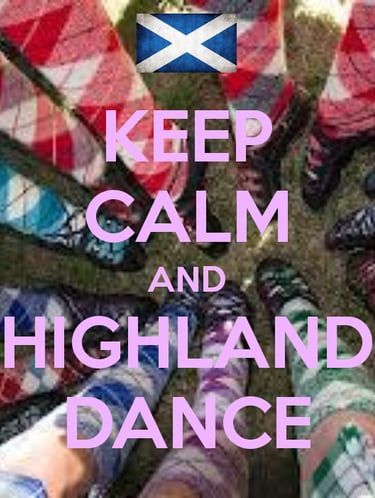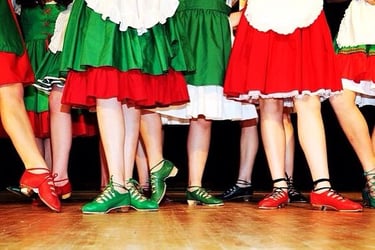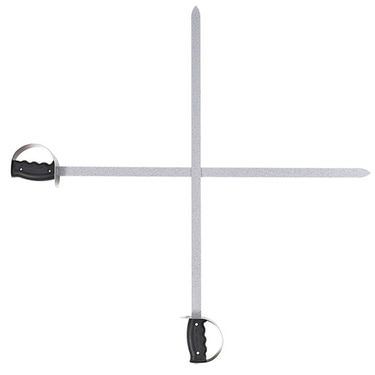Upcoming 2026 Competitions in England
February 14th * Corby Grampian
February 28th * Central England Open Championship & competition
March 28th * York
April 25th * East Midlands
April 25th * Uxbridge (Tartan Thistle Dance Festival)
June 6th * Highland Friends - Barton Seagrave
July 11th & 12th * All-England Open/Closed Championships
October 17th * Spirit of Northants
RSOBHD Championship Steps 2026
RSOBHD Premiership Steps 2026


How are competitions organized?
Beginning dancers can enter competitions and more experienced dancers can go on to enter championships. Competitions of various sizes take place throughout the year in England (as well as Scotland and around the world). Some competitions are held outside the auspices of the RSOBHD. The HDTAE strongly advises dancers to participate only in competitions registered with the RSOBHD as dancers taking part in non-approved competitions will not be allowed to compete in RSOBHD competitions.
Dancers progress through a number of competition categories. These are based on ability and then divided appropriately by age. Dancers compete in mixed-gender categories with all dancers performing both traditional Highland and National dances. In the National dances, you will see variations depending on the teacher’s syllabus and between males and females.
PRE-PREMIER categories are as follows:
Primary (ages 4-6)
Young dancers stay in Primary until their 7th birthday. Dancers compete in the Pas de Basques, Pas de Basques and High Cuts, Fling, and Sword. They receive medals based on their results and usually a participatory prize is given to all Primary dancers to encourage them.
Beginners (7 yrs and over)
Starting at age 7, dancers collect stamps for their prizes. 6 stamps (placing 1st, 2nd, or 3rd in a Highland dance) at 6 different competitions means that dancer is ready to move to Novice. If a dancer collects 6 stamps in under 12 months, they are allowed to stay in Beginner until 12 months after their 1st stamp. (It sounds more complicated than it is.)
Novice
This category follows the same rules as Beginners. Dancers collect 6 stamps at 6 different competitions for placing 1st, 2nd, or 3rd in any of their dances. Dancers compete in Novice for a minimum of 1 year.
Beginner & Novice Highland Dances: Highland Fling, Sword Dance, Sean Truibhas, Highland Reel, special/trophy Fling
National Dances: Scottish Lilt, Flora Macdonald’s Fancy
Intermediate
The rules are again the same for Intermediate dancers. They collect 6 stamps at 6 different competitions with a minimum 12 months spent at this level. In this time, dancers have to learn many more National dances and variations for the Highland steps. The music gets slower as dancers are expected to develop strength and stamina in preparation for Premier.
Highland Dances: Highland Fling, Sword Dance, Sean Truibhas, Highland Reel
National Dances: Scottish Lilt, Flora Macdonald’s Fancy, Wilt Thou go to the Barracks Johnnie?, Highland Laddie
Character National Dances: Irish Jig, Sailor's Hornpipe
PREMIER
Premier is the ‘top’ category and dancers no longer collect stamps. There are many more National dances to be learnt for Premier and the Highland dances get longer (and slower) in preparation for the championship season.
Highland Dances: Highland Fling, Sword Dance, Sean Truibhas, Reels
National Dances: Scottish Lilt, Flora Macdonald’s Fancy, Wilt Thou go the the Barracks Johnnie, Highland Laddie,
Blue Bonnets o'er the Border, Village Maid, Earl of Errol, Scotch Measure
Character National Dances: Irish Jig, Sailor's Hornpipe
Premier group dances may be competed where the dancers are judged together as a team rather than soloists.
Broadsword (4 dancers), Highland Reel (4 dancers)
Premier Championship
Championships are different from regular competitions because they have steps set annually by the RSOBHD which every dancer must use. The dances are long versions of the Fling, Sword, Sean Truibhas, and Reel. There are 3 judges on each platform whose marks are then scrutineered for the final results. Any premier dancer can enter a championship, knowing the competition will be fierce. The World Championship held in Cowal, Scotland the last weekend of August follows this format and is entered by dancers from around the world. There are also "Premiership" competitions with set steps for the National and character dances.
Choreography Competitions
Choreography competitions are another offering. Some competitions choose to hold 1 or 2 events linked to a regular competition, or they made hold an entire choreography competition. The dances may be solo, duo/trio, small group (usually 4-6), or large group (usually 7+). Sometimes there will be a theme given or a set piece of music for teachers to choreograph to. Awards in choreography dances do not count towards dancer advancement, but are a way to keep highland dancing creative and innovative. Dances are usually split into pre-premier and premier categories, although there are some ‘open’ where all dancers from the same studio can perform together.


